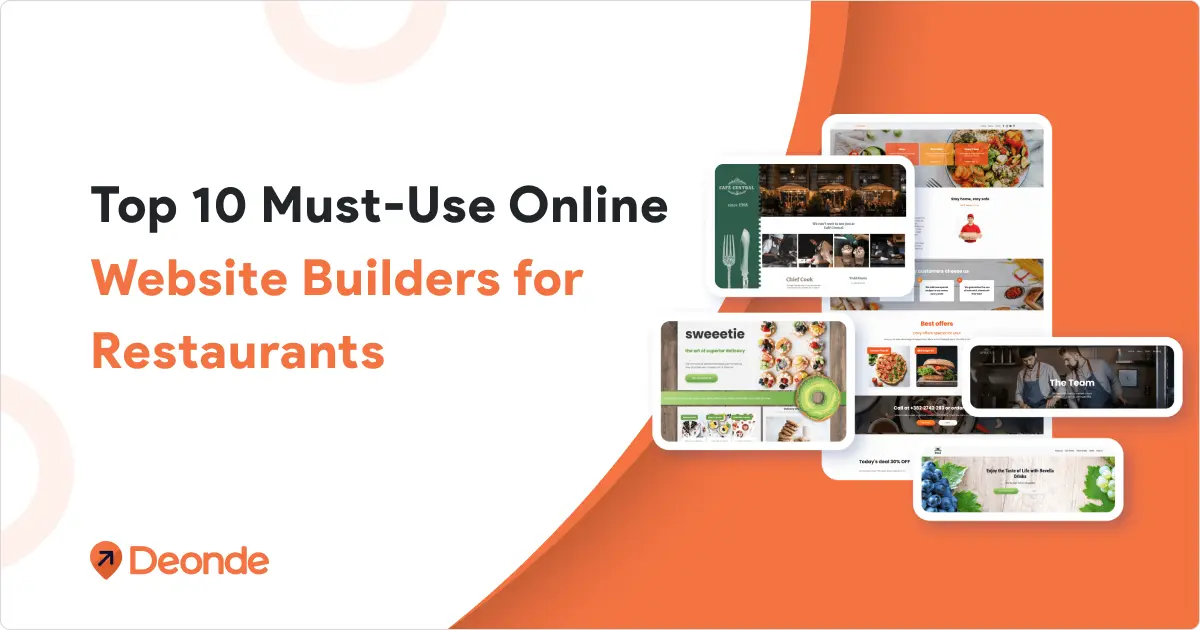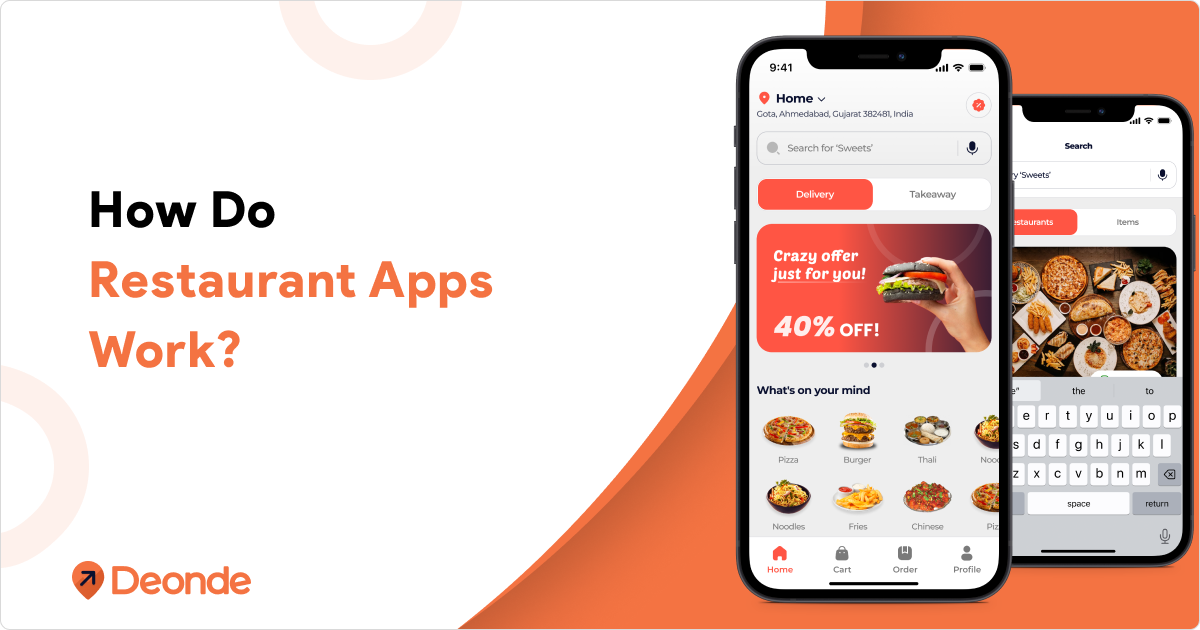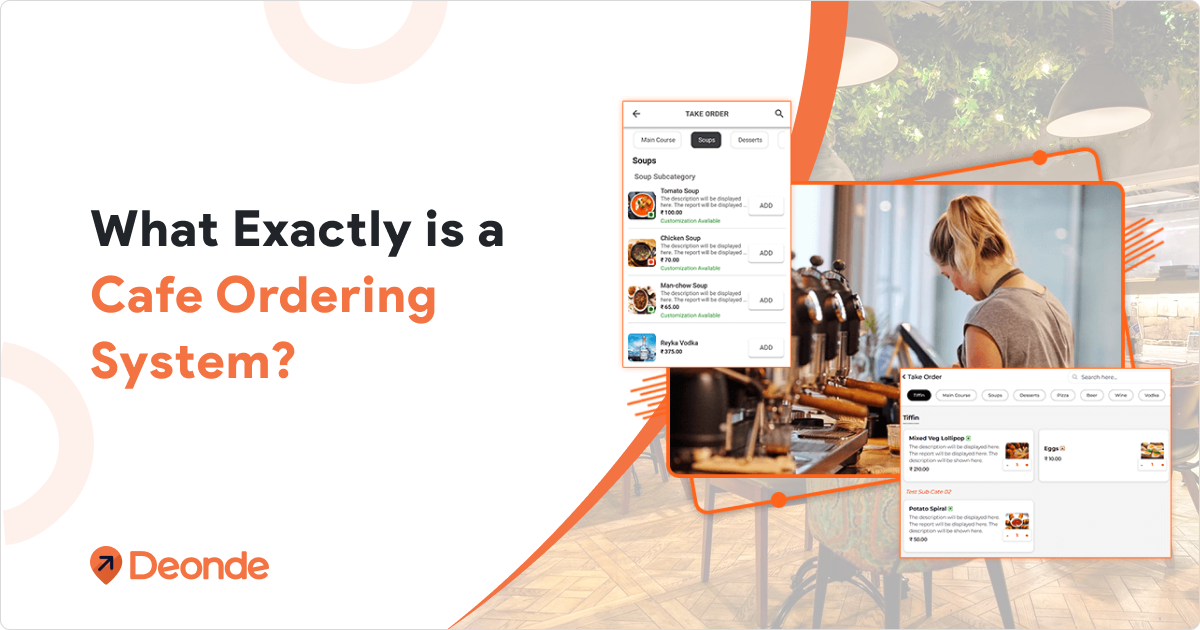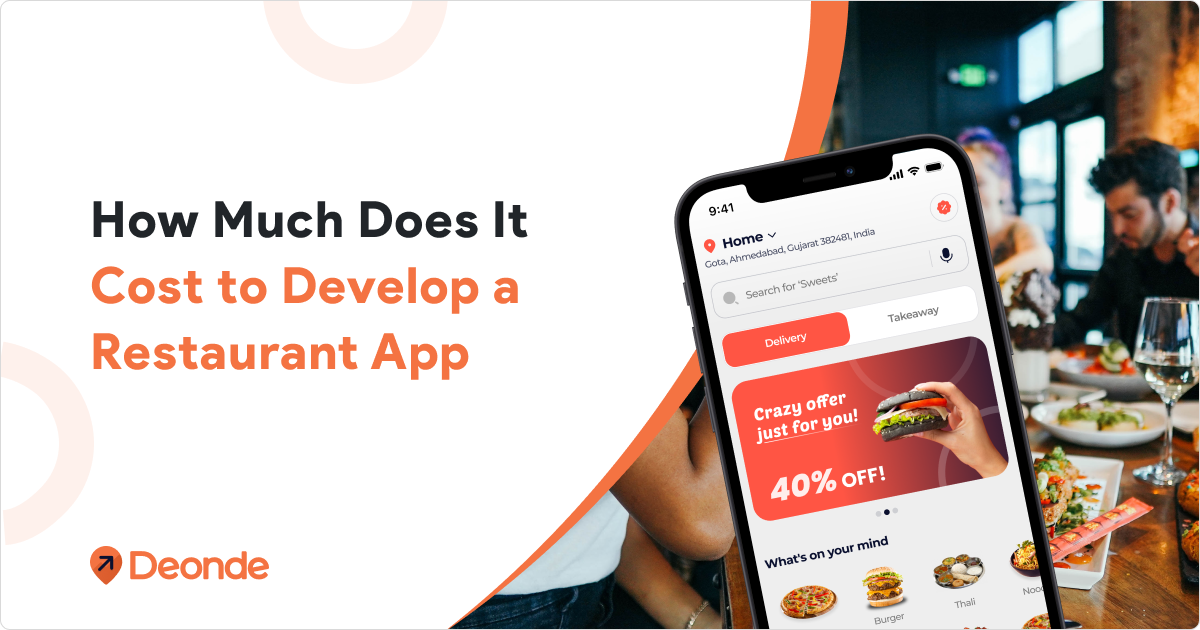Running a restaurant is no small feat. From crafting the perfect menu to managing reservations and boosting online orders, your plate is already full. A well-designed website can lighten the load by connecting you with customers, streamlining operations, and driving sales.
But with so many website builders out there, how do you choose the right one for your restaurant? Whether you’re a cosy café, a bustling food truck, or a fine-dining hotspot, this guide breaks down the top 10 online website builders for restaurants in 2025, tailored to help you meet your business goals.
We’ve spent hours researching, testing, and talking to restaurant owners to bring you a list that’s comprehensive, practical, and packed with first-hand insights.
Our goal? We aim to help you find a platform that fits your needs, whether showcasing mouthwatering dishes, accepting online orders, or managing reservations seamlessly.
Let’s dive in and explore the best options, including Deonde, WordPress, Hostinger, Wix, Site123, Jimdo, Renderforest, Restaurantify, One.com, and Flavor Plate.
Why Your Restaurant Needs a Website Builder
Before we jump into the list, let’s address the why. A restaurant website isn’t just a digital menu; it’s your online storefront, a marketing tool, and a way to engage customers directly.
According to recent data, 70% of customers check a restaurant’s website before visiting or ordering, and 30% of online orders come from direct website visits rather than third-party apps like Uber Eats.
A website builder simplifies the process of creating a professional site, saving you time and money while helping you compete in a digital-first world.
Who needs a restaurant website? Café owners, food truck operators, fine-dining chefs, and local diner managers—anyone looking to boost their brand and sales.
How does it help? It showcases your menu, streamlines orders, and builds customer loyalty without hefty third-party fees. Let’s explore the top 10 platforms that make this possible.
List of 10 Best website builders for restaurants in 2025
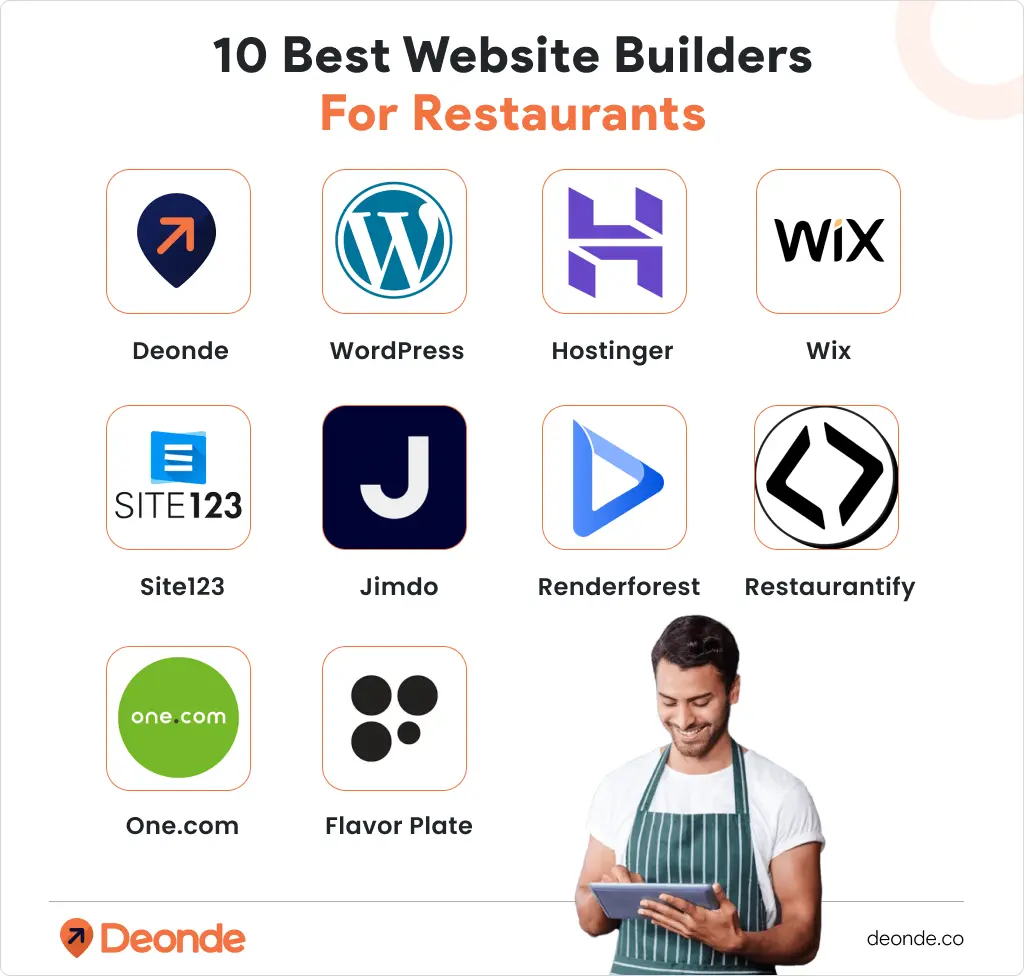
From fine dining establishments to food trucks, these platforms offer the perfect blend of functionality and style from fine dining establishments to food trucks. Each platform is tailored to different restaurant needs, from online ordering to aesthetic-focused branding.
1. Deonde: Best All-in-One Platform for Total Restaurant Management
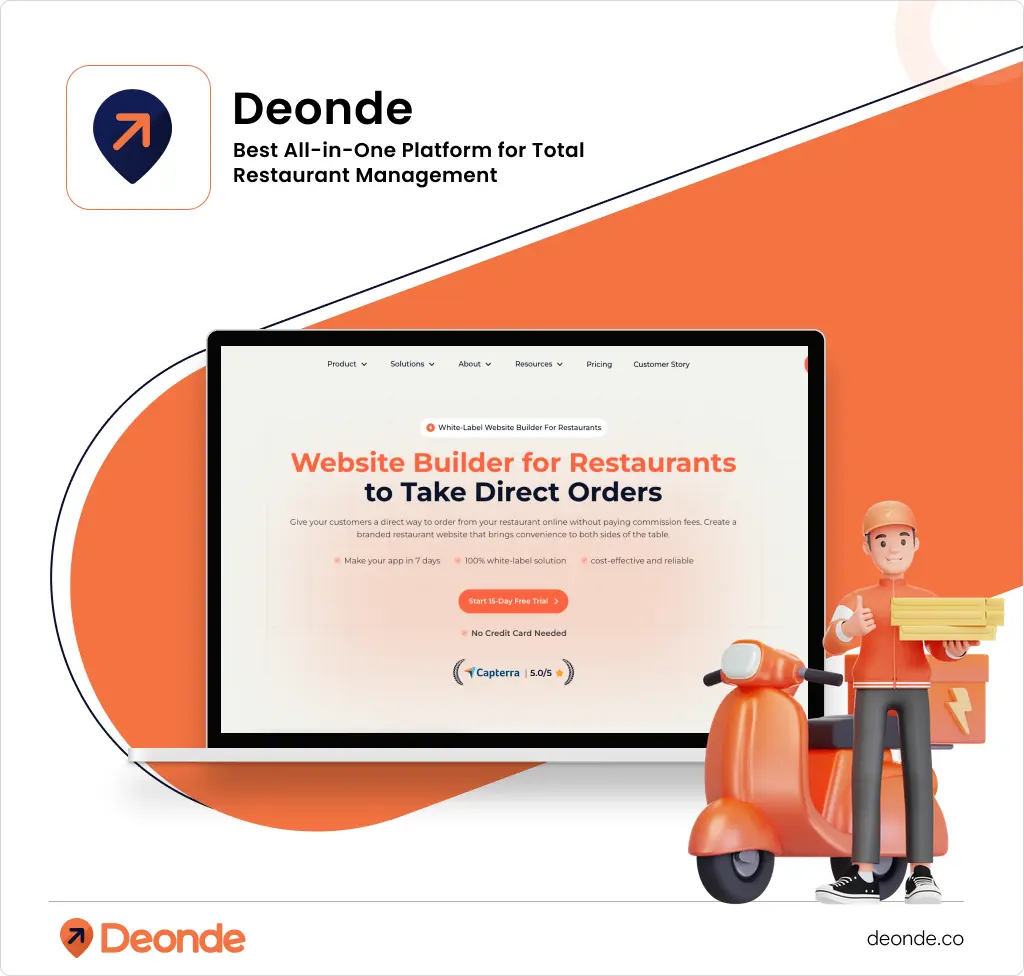
Standout Feature: A single, unified platform for dine-in, takeout, delivery, and marketing.
|
Try Deonde if you… |
Avoid Deonde if you… |
|
• Want to manage dine-in reservations and online orders together |
• Only need a static, non-functional “brochure” website |
|
• Need an integrated system for QR code ordering and payments |
• Have no plans to manage customer data or build loyalty |
|
• Want to escape commission fees on both takeout and dine-in orders |
• Are not looking for a long-term operational partner |
Why Deonde?
Deonde is a complete operating system for the modern restaurant, built to unify every aspect of your business. It seamlessly connects your on-premise (dine-in) and off-premise (takeout & delivery) operations. This means you can manage table reservations, waitlists, and commission-free online orders from a single dashboard.
Deonde empowers you to offer modern conveniences like QR code ordering at the table while also building a powerful direct delivery channel. By centralising your operations and customer data, Deonde helps you increase efficiency, improve the guest experience, and maximise profitability across your entire business.
Key Features
- Unified Ordering System: Manages commission-free takeout, delivery, and dine-in QR code orders.
- Full Reservations & Table Management: Integrated system for online bookings, waitlists, and guest seating.
- Customer Loyalty & Marketing Suite: Own your guest data and drive repeat visits with email, SMS, and loyalty programs.
- Delivery & Driver Management: Manage your own drivers or connect with delivery partners without commission fees.
- Branded Website & Mobile App: A professional online presence that consolidates all your services under your brand.
Best For
Any modern restaurant, from fine dining and casual sit-down establishments to pizzerias and multi-location groups, wants a single platform to streamline all operations and boost profitability.
2. WordPress: Best for Maximum Customization
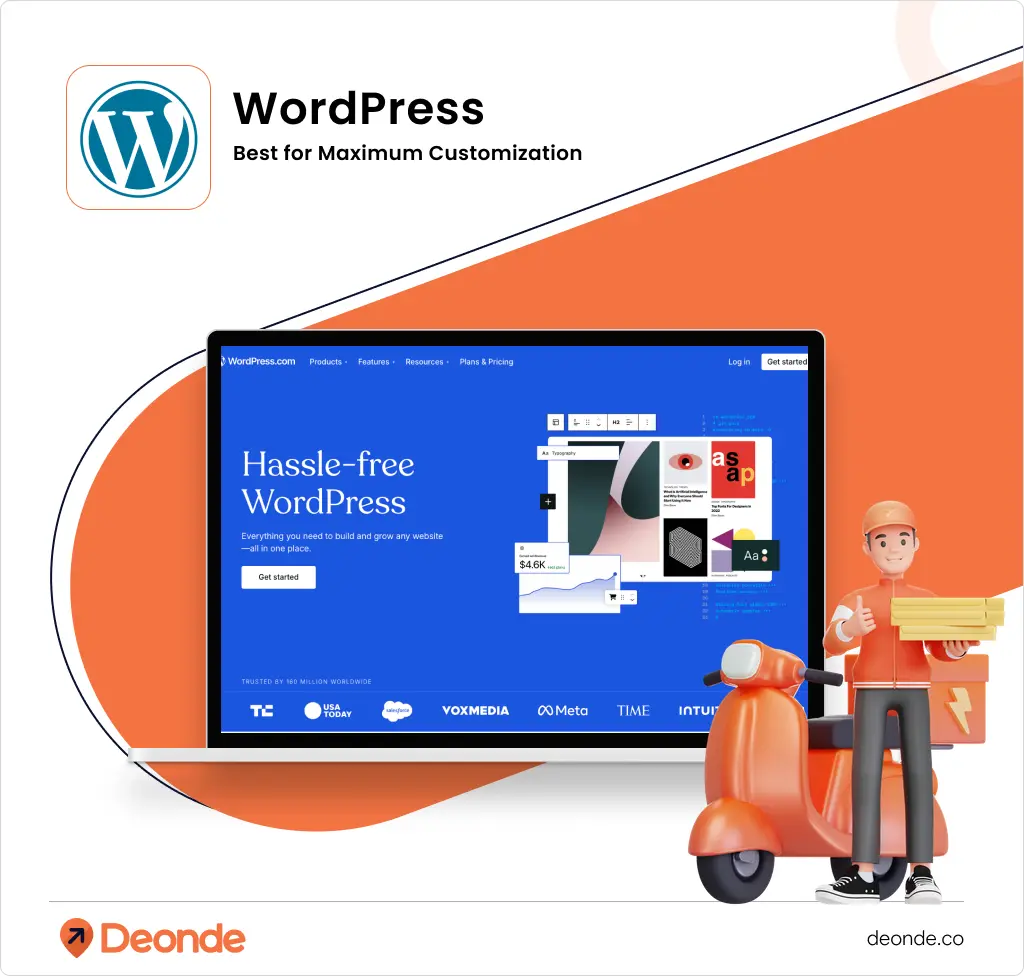
Standout Feature: Unparalleled flexibility with plugins and themes
|
Try WordPress if you… |
Avoid WordPress if you… |
|
• Want complete control over design and functionality |
• Want a simple, drag-and-drop builder |
|
• Are you comfortable with the technical setup, or do you have a developer |
• Lack of technical expertise |
|
• Need advanced features like reservations or eCommerce |
• Need a quick setup |
Why WordPress?
WordPress is a content management system (CMS) offering unmatched customisation. With thousands of restaurant-specific themes and plugins (e.g., WP Restaurant Booking, WooCommerce), you can create a website tailored to your vision. However, it requires hosting and technical know-how, making it ideal for those willing to invest time or hire a developer.
Key Features
- Custom Themes: Hundreds of restaurant templates, from minimalist to luxurious.
- Plugins: Add reservations, online ordering, or SEO tools.
- Scalability: Suitable for single locations or chains.
- Community Support: Vast resources and tutorials available.
Best For
Upscale restaurants or chains need a fully customised site with advanced features.
3. Hostinger: Best for AI-Powered Efficiency
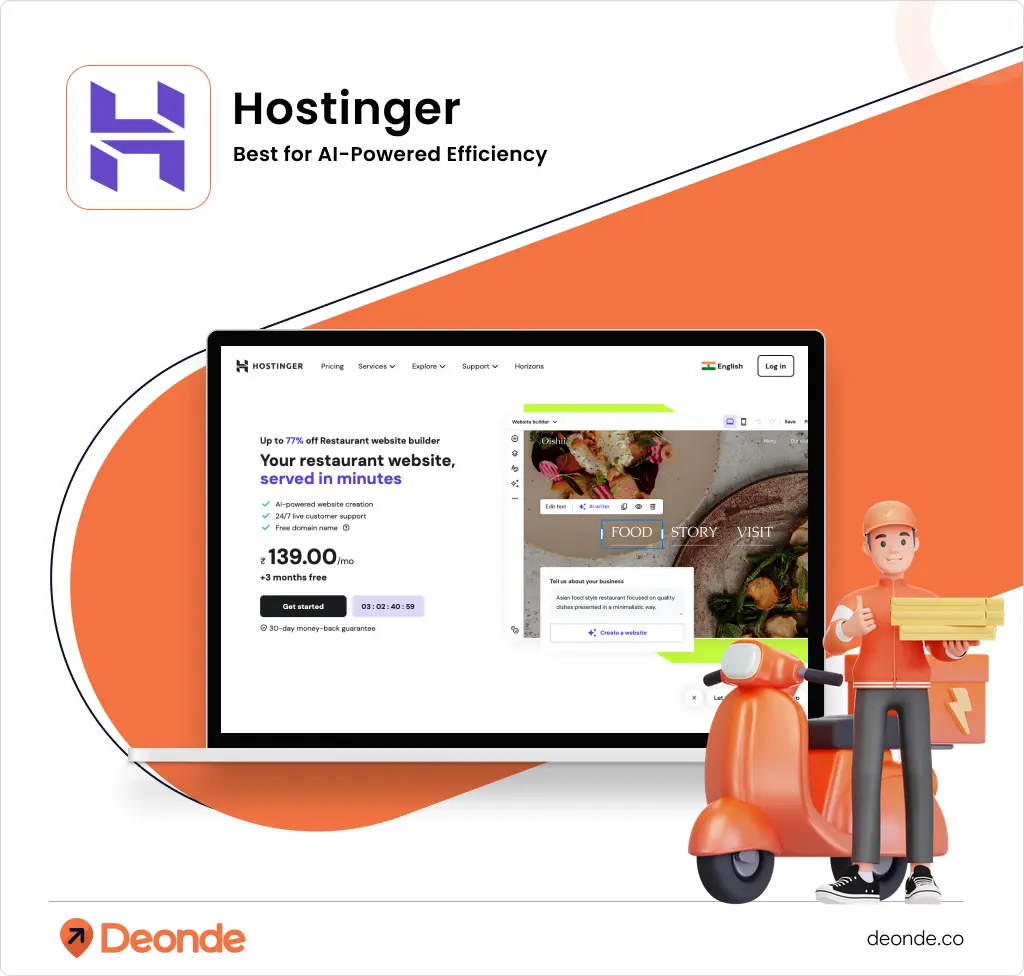
Standout Feature: AI tools for quick setup and menu creation
|
Try Hostinger if you… |
Avoid Hostinger if you… |
|
• Want a fast, affordable setup |
• Need POS integration |
|
• Have an extensive menu to manage |
• Want robust email marketing tools |
|
• Use delivery apps like Uber Eats |
• Run a large chain |
Why Hostinger?
Hostinger’s AI-powered website builder is a time-saver for busy restaurant owners. Its AI can generate menu descriptions, blog posts, and even heatmaps to optimise user experience. Hostinger integrates with delivery apps and supports guest checkout, making it ideal for diners and takeout-focused businesses.
Key Features
- AI Tools: Auto-generate menu descriptions and content.
- Delivery Integration: Sync with Uber Eats or DoorDash.
- Affordable Plans: Starts at $2.99/month with a 30-day free trial.
- Mobile-Friendly Templates: Restaurant-specific designs.
Best For
Diners and small restaurants need a quick, budget-friendly website with AI assistance.
4. Wix: Best for Design Flexibility
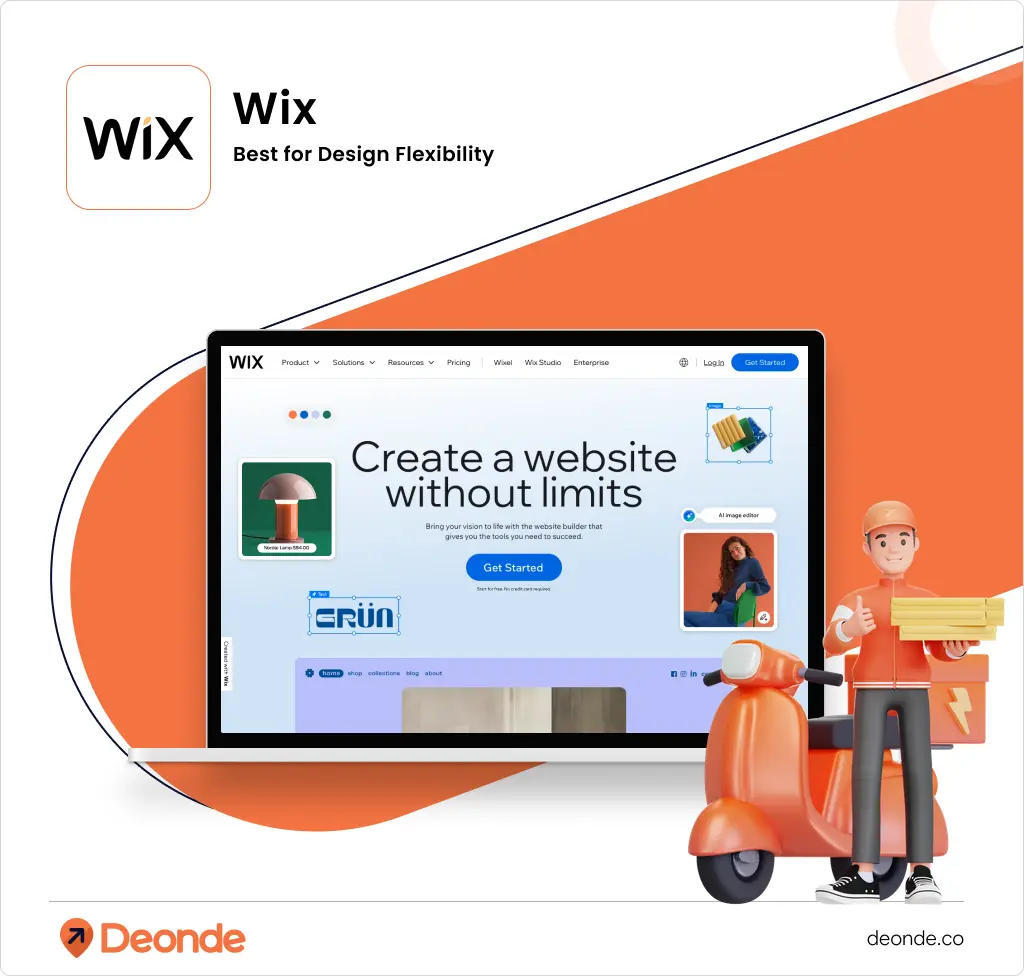
Standout Feature: Wix Restaurant Apps for seamless management
|
Try Wix if you… |
Avoid Wix if you… |
|
• Want customisable, restaurant-specific templates |
• Need cheap POS options |
|
• Need online reservations and ordering |
• Want to frequently change templates |
|
• Manage multiple locations |
• Run a large chain |
Why Wix?
Wix is a versatile choice with a drag-and-drop editor and restaurant-specific apps (Wix Restaurant Menus, Orders, and Table Reservations). It supports online ordering, guest checkout, and “buy one, get one free” promotions, making it perfect for food trucks and fast food joints.
Key Features
- Restaurant Apps: Manage menus, orders, and reservations.
- Customisable Templates: Hundreds of mobile-friendly designs.
- Promotions: Easy setup for deals and coupons.
- Multi-Location Support: Manage several sites from one dashboard.
Best For
Food trucks and fast food restaurants need a feature-rich, customisable site.
5. Site123: Best for Simplicity
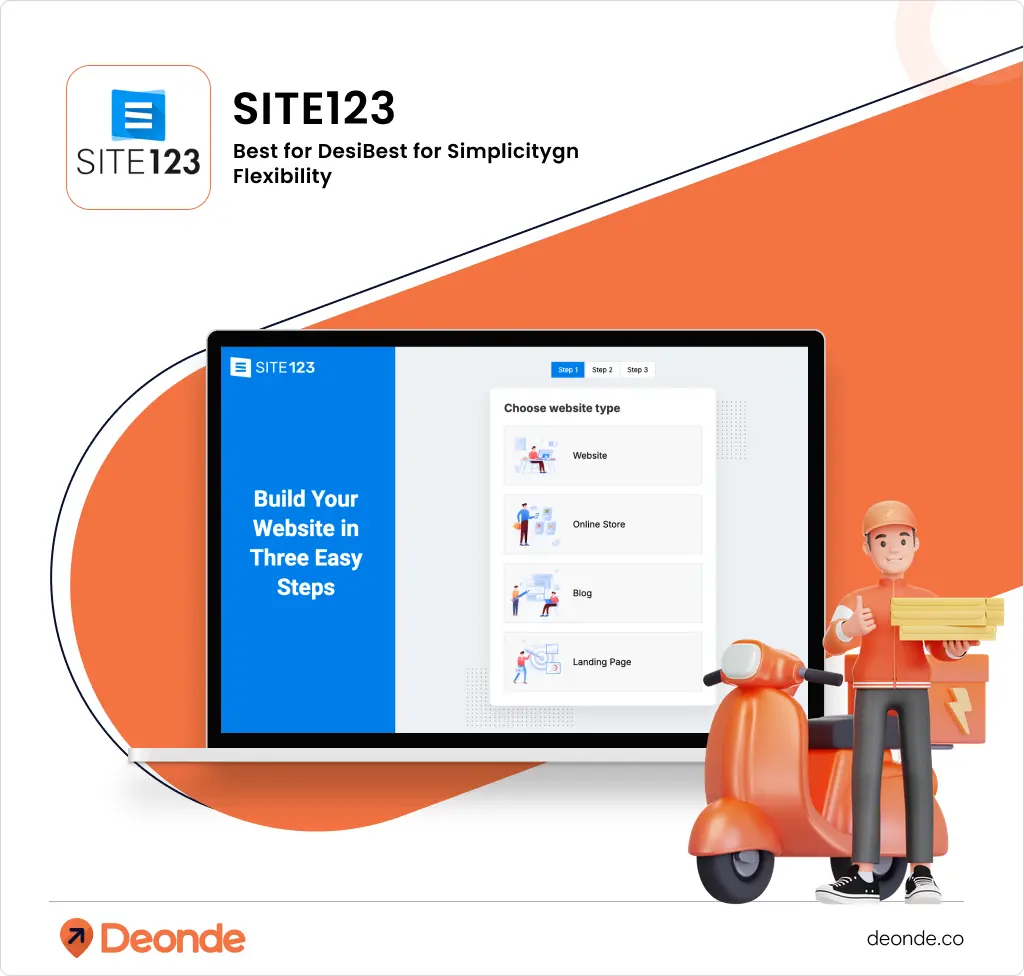
Standout Feature: Quick and easy setup for beginners
|
Try Site123 if you… |
Avoid Site123 if you… |
|
• Need a simple website fast |
• Need advanced eCommerce features |
|
• Want affordable pricing |
• Want highly customised designs |
|
• Prioritize ease of use |
• Require POS integration |
Why Site123?
Site123 is perfect for restaurant owners who want a no-fuss website. Its straightforward editor and restaurant templates make it easy to create a site with menus, hours, and contact details. It supports basic online ordering but lacks advanced features like POS integration or complex inventory management.
Key Features
- Simple Editor: Drag-and-drop with a minimal learning curve.
- Restaurant Templates: Pre-designed for cafes and diners.
- Basic eCommerce: Accept online orders on premium plans.
- Multilingual Support: Great for diverse customer bases.
Best For
Small cafes or local diners need a quick, simple online presence.
6. Jimdo: Best for Budget-Friendly Design
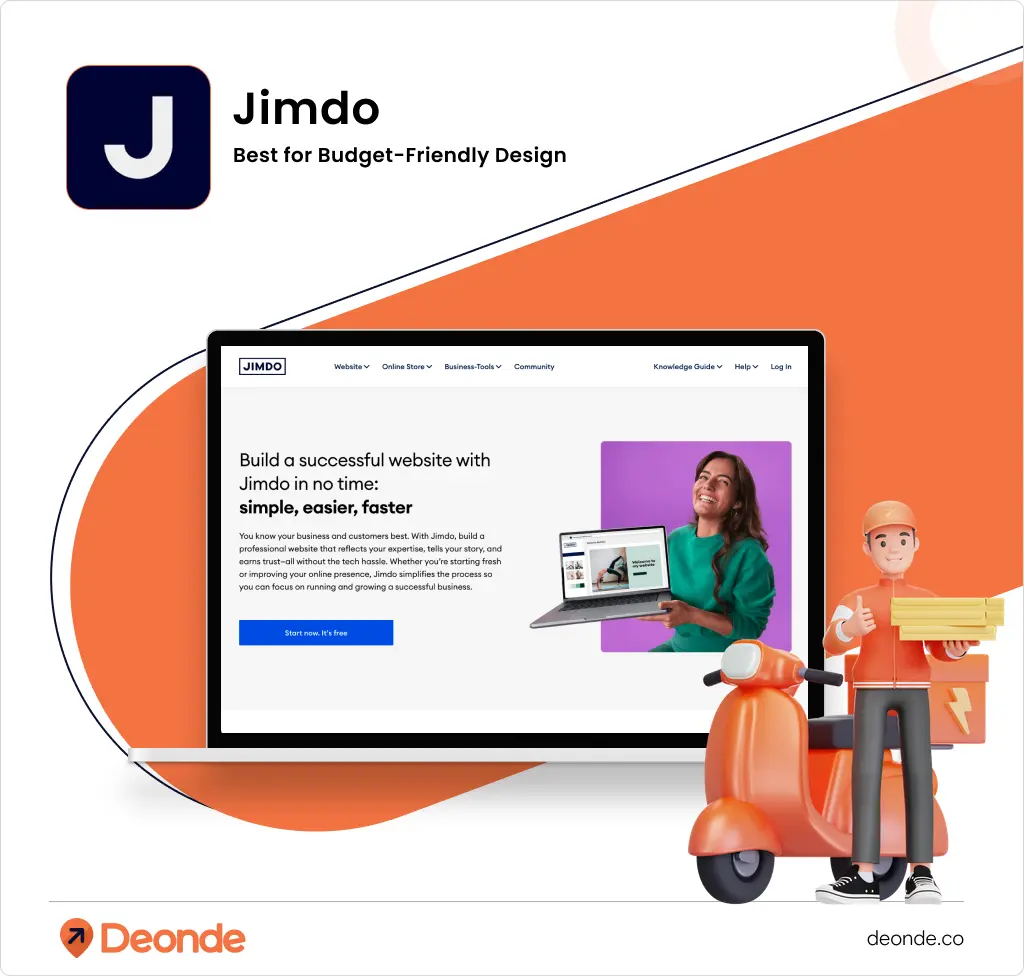
Standout Feature: AI-driven design with affordable pricing
|
Try Jimdo if you… |
Avoid Jimdo if you… |
|
• Want an AI-designed site |
• Need advanced sales features |
|
• Need a budget-friendly option |
• Want deep customisation |
|
• Run a small restaurant |
• Require multi-location support |
Why Jimdo?
Jimdo’s AI builder (Jimdo Dolphin) creates a website in minutes based on your input. It’s ideal for small restaurants needing a professional site without breaking the bank. While it offers basic online ordering, it lacks robust POS or inventory tools, making it less suitable for complex operations.
Key Features
- AI Builder: Generates a site with menus and images.
- Mobile Optimization: All templates are responsive.
- Basic eCommerce: Sell food or gift cards online.
- SEO Tools: Improve local search visibility.
Best For
Local bistros or cafes on a tight budget.
7. Renderforest: Best for Visual Storytelling

Standout Feature: Video and animation tools for engaging websites
|
Try Renderforest if you… |
Avoid Renderforest if you… |
|
• Want to showcase food with videos |
• Need advanced restaurant features |
|
• Need a modern, visual site |
• Require POS integration |
|
• Are a new restaurant |
• Want extensive customisation |
Why Renderforest?
Renderforest stands out for its video and animation tools, which are perfect for restaurants wanting to showcase their dishes or ambience through dynamic visuals. Its website builder is user-friendly, with restaurant templates that support menus and basic online ordering. However, it’s limited in advanced restaurant-specific features.
Key Features
- Video Integration: Embed food or venue videos.
- Restaurant Templates: Sleek, mobile-friendly designs.
- Basic eCommerce: Sell food or merch online.
- Logo Maker: Create a branded logo for free.
Best For
New restaurants or cafes emphasise visual branding.
8. Restaurantify: Best for Restaurant-Specific Templates
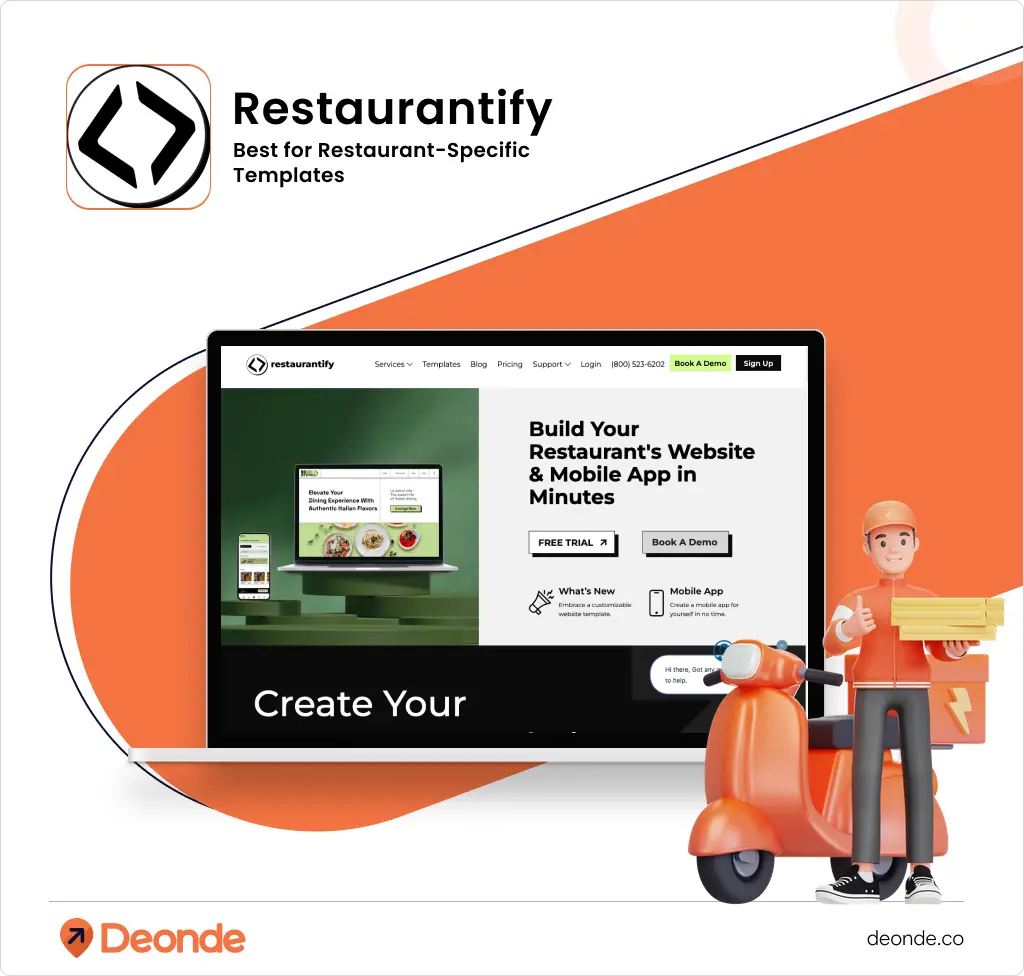
Standout Feature: Tailored templates for restaurants
|
Try Restaurantify if you… |
Avoid Restaurantify if you… |
|
• Want pre-built restaurant templates |
• Need scalable features for chains |
|
• Need online ordering and reservations |
• Want advanced POS integration |
|
• Prefer a niche platform |
• Are on a very tight budget |
Why Restaurantify?
Restaurantify is explicitly designed for restaurants, offering templates optimised for menus, reservations, and online ordering. It integrates with platforms like OpenTable and supports delivery options. While not as feature-rich as Wix or Deonde, it’s a solid choice for small to medium-sized restaurants.
Key Features
- Restaurant Templates: Pre-built for cafes, diners, and bistros.
- Reservations: Integration with OpenTable or similar.
- Online Ordering: A basic system for takeout and delivery.
- SEO Tools: Boost local visibility.
Best For
Small to medium restaurants need a tailored solution.
9. One.com: Best for Basic Websites
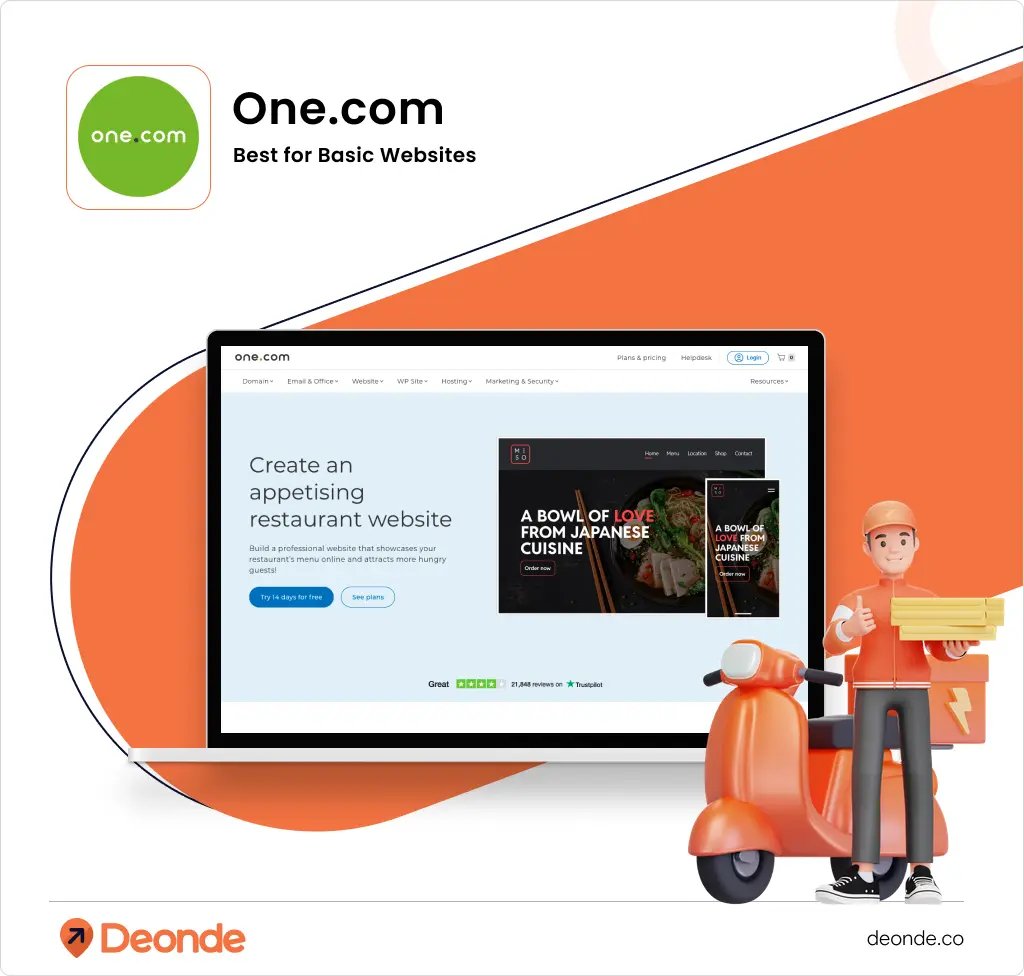
Standout Feature: Affordable, no-frills website building
|
Try One.com if you… |
Avoid One.com if you… |
|
• Need a simple informational site |
• Need advanced eCommerce |
|
• Want low-cost hosting |
• Want deep customisation |
|
• Are a small café or diner |
• Require restaurant-specific apps |
Why One.com?
One.com is a budget-friendly option for restaurants needing a basic “brochure” website to display menus, hours, and contact details. Its editor is simple, and hosting is included, but it lacks advanced restaurant features like POS or robust online ordering.
Key Features
- Simple Editor: Easy to use for beginners.
- Hosting Included: No separate hosting fees.
- Basic Templates: Restaurant-friendly designs.
- Email Hosting: Professional email addresses.
Best For
Small cafes or diners need a simple, affordable site.
10. Flavor Plate: Best for Quick Restaurant Setup
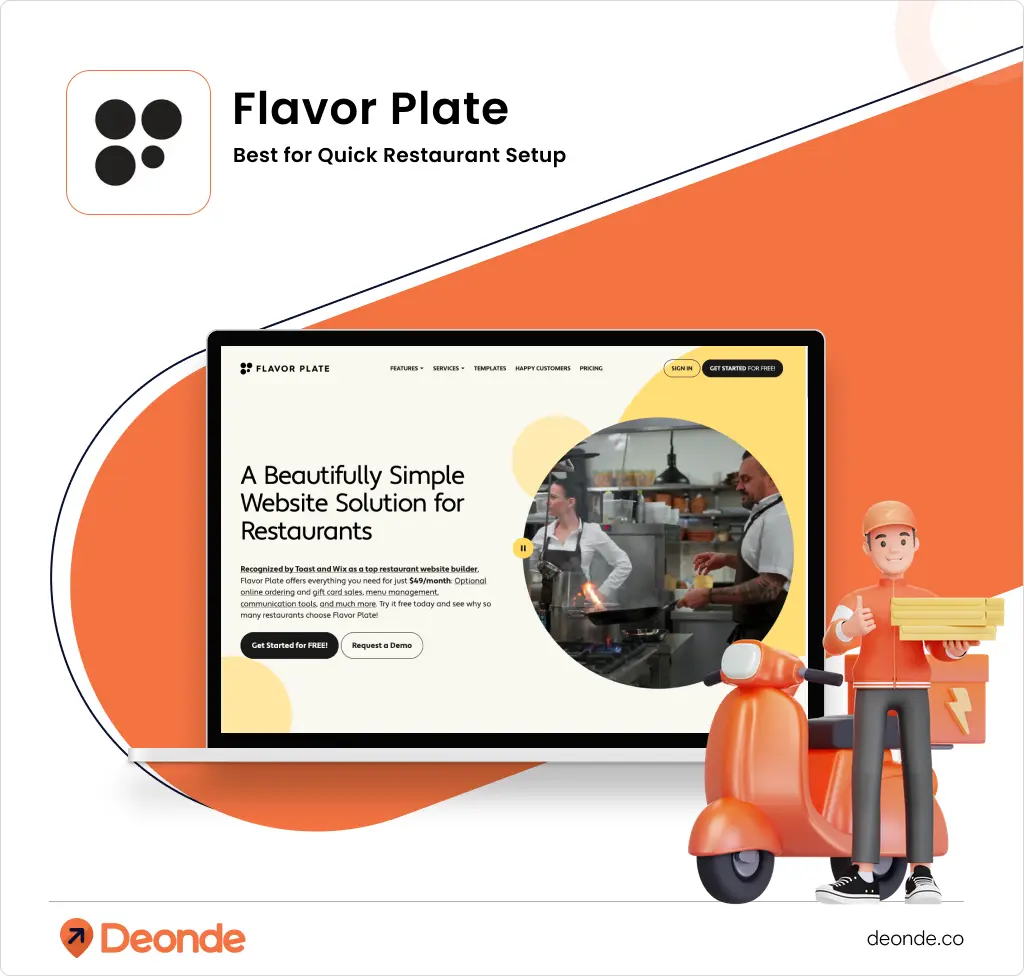
Standout Feature: Restaurant-focused templates with fast setup
|
Try Flavor Plate if you… |
Avoid Flavor Plate if you… |
|
• Want a restaurant-specific builder |
• Need advanced sales tools |
|
• Need a site up quickly |
• Want complete design control |
|
• Are a small restaurant |
• Run a large chain |
Why Flavor Plate?
Flavour Plate is a niche builder designed for restaurants, offering templates for menus, reservations, and basic online ordering. Its drag-and-drop editor is beginner-friendly, and it integrates with third-party tools like OpenTable. However, it’s less scalable for larger operations.
Key Features
- Restaurant Templates: Tailored for dining businesses.
- Reservations: Supports third-party integrations.
- Basic Online Ordering: Takeout and delivery options.
- Mobile Optimization: All sites are responsive.
Best For
Small restaurants need a quick, restaurant-focused site.
Our Recommendations
Here’s a quick recap of the top 10 restaurant website builders for 2025:
1. Deonde: Best All-in-One Platform for Total Restaurant Management.
2. WordPress: Best for Maximum Customization.
3. Hostinger: Best for AI-Powered Efficiency.
4. Wix: Best for Design Flexibility.
5. Site123: Best for Simplicity.
6. Jimdo: Best for Budget-Friendly Design.
7. Renderforest: Best for Visual Storytelling.
8. Restaurant: Best for Restaurant-Specific Templates.
9. One.com: Best for Basic Websites.
10. Flavor Plate: Best for Quick Restaurant Setup.
How We Chose the Best Restaurant Website Builders
To ensure our recommendations meet the needs of restaurant owners, we evaluated each builder based on the following criteria:
- Website Features (25%): Menu creation, online ordering, and reservation tools—whether built-in or via integrations.
- Sales Features (25%): POS integration, payment options, inventory management, and transaction fees.
- Design Functionality (20%): Template quality, mobile responsiveness, and customisation options.
- Ease of Use (15%): How intuitive the platform is for non-tech-savvy users.
- Help & Support (10%): Availability of support channels like live chat, email, or phone.
- Value for Money (5%): Pricing versus feature quality.
- Customer Score (5%): User reviews and industry reputation.
Conclusion
Your restaurant’s online presence matters as much as your food and service. Choosing the right online website builder from this list does more than create a site. It helps you attract new diners, serve current ones better, and stand out in the busy culinary world.
The “best” platform truly depends on your needs, budget, and comfort level. We hope this guide helps you feel prepared to make an informed decision and begin your journey to a strong online presence.

